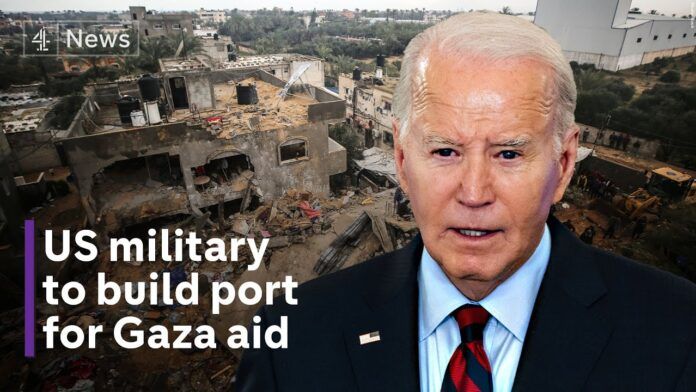Critics call the US port plan a ‘distraction’ from Gaza’s humanitarian crisis and Israel’s blockade
In a bold move to address the escalating humanitarian crisis in Gaza, US President Joe Biden announced a plan to establish a temporary port off Gaza’s coast, aiming to enhance the delivery of crucial aid to the region. Despite intentions to circumvent Israel’s stringent blockade, which severely limits aid flow into Gaza, the initiative has drawn sharp criticism. Accusations suggest the plan serves more as a political smokescreen than a viable solution to the dire famine affecting hundreds of thousands within the enclave.
On March 5, 2024, amidst a backdrop of widespread hunger, Palestinian children in the southern Gaza Strip’s Rafah received cooked food rations, underscoring the acute need for consistent and unimpeded humanitarian assistance. The proposed port, which Biden highlighted in his recent State of the Union address, intends to facilitate the entry of food, water, medicine, and temporary shelters into Gaza via the Mediterranean. However, the plan’s absence of US military personnel on Gazan soil, as Biden assured, leaves many sceptical of its effectiveness and real intentions.
The criticism hinges on the perception that the port project attempts to divert global attention from the root causes of Gaza’s plight, notably Israel’s relentless blockade and the US’s simultaneous support of the Israeli military. Mustafa Barghouti, Secretary General of the Palestinian National Initiative, voiced concerns to Al Jazeera, pointing out the initiative as a potentially misleading endeavour that overlooks the immediate necessity to end the blockade and ensure aid reaches all of Gaza.
Furthermore, the feasibility and efficiency of maritime aid delivery have been questioned. UN and humanitarian officials stress that land routes remain the most practical channels for aid, arguing for the reopening of existing crossings like Karem Abu Salem and Rafah for more direct, safe, and cost-effective assistance.
Melanie Ward, CEO of Medical Aid for Palestinians, emphasized the urgency for a lasting ceasefire and the reopening of land crossings by Israel. Without these measures, alternative solutions like airdrops and temporary ports offer no sustainable relief to the looming famine and ongoing suffering in Gaza.
Since 1967, Israel has controlled Gaza’s coastline and territorial waters, imposing a naval blockade that, since 2007, has significantly restricted access to the Strip. The recent conflict has only exacerbated the enclave’s isolation, with Israel allowing minimal aid and instances of violence against Palestinians seeking assistance.
The US’s temporary port proposal thus stands at the crossroads of humanitarian aid and political complexity. While the initiative represents a novel approach to bypassing the blockade, its success and sincerity remain under scrutiny, highlighting the broader challenges of addressing Gaza’s humanitarian disaster amid ongoing conflict and geopolitical tensions.
